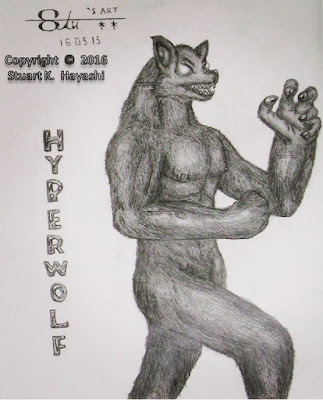 |
| Stuart K. Hayashi's drawing of a werewolf from May 15, 2016. |
Monsters represent not merely fear, but fear of the weird outcast. People are often under the misapprehension that someone being a bullied outcast is an indication of weakness. But part of what people most fear about a monster is that it is strong -- strong enough to overcome them in a struggle. And such people not only fear the weird outcast; they fear still more fiercely the possibility that they themselves one day might become that weird outcast.
But there are times when corruption comes to pervade mainstream society, and standing up for moral principle will cause one to be regarded as the weird outcast, the monster. In such instances, one should stand up for principle anyway; being rational involves making peace with this fact.
The Creature from the Black Lagoon is the true hero. He was minding his own business and then normal society intruded on his stewardship. By dressing up on Halloween, children take control over what society usually fears; the ritual of children costuming themselves as the much-feared monsters reminds our children that they need not fear the weird outcast, nor should they think that being regarded as the strange outcast will render them weak. If necessary, exercise the courage to be that weird outcast, that lone wolf . . . that monster. 🐺🐲🐉🎃😈👿👾